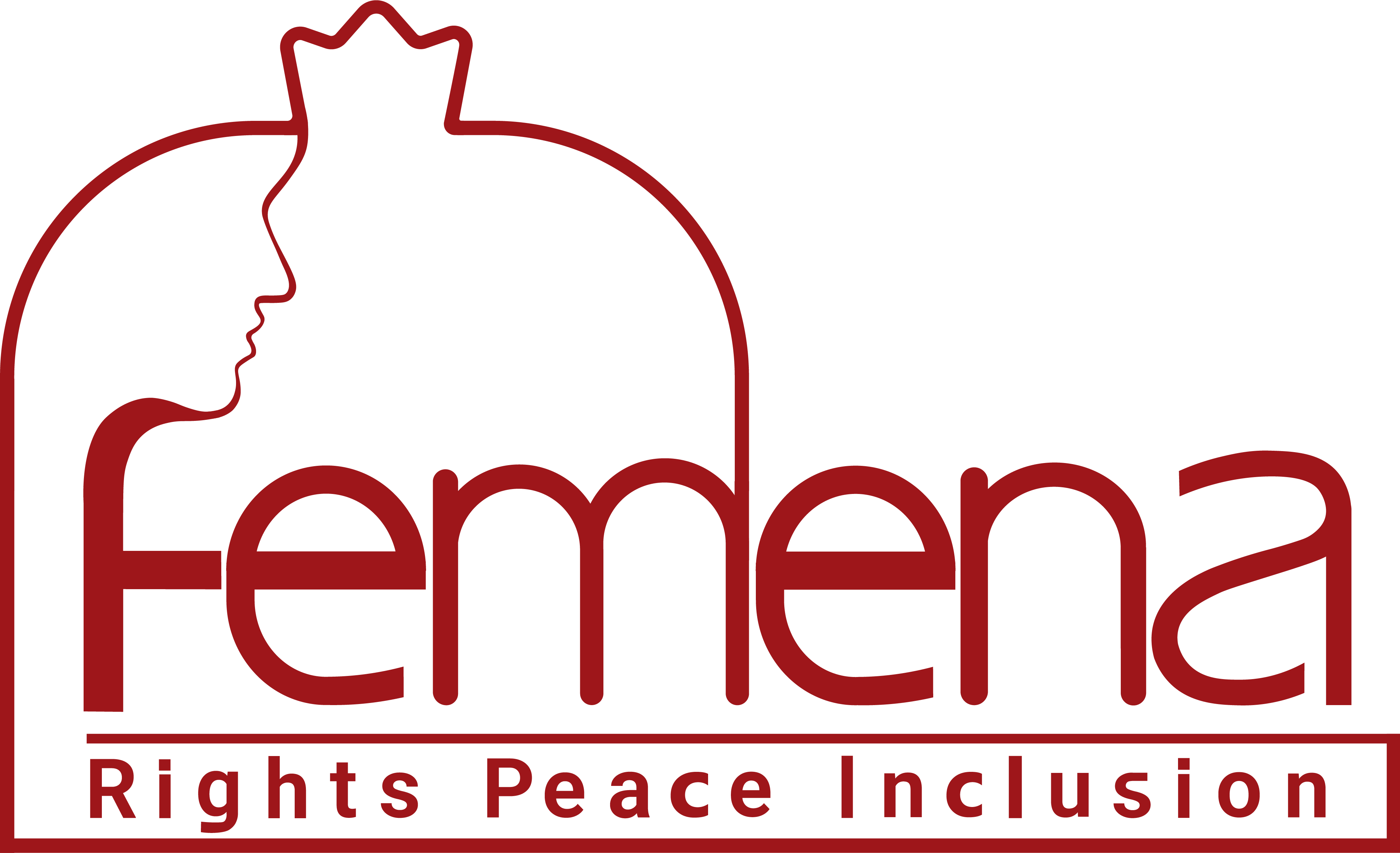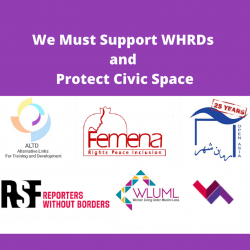The space for civic engagement has been shrinking around the globe. Across much of North Africa and West Asia, civic space has become extremely limited, and activism has become increasingly dangerous and at times deadly. Human rights defenders are targeted by State and non-state actors, and their ability to organize and establish organizations is severely restricted. These restrictions impact women differently and often more severely. While WHRDs and their organizations are targeted, in many countries legislation is being introduced to push back women’s hard-won gains as well.
In observance of International Women’s Day 2021, Femena along with five other organizations, organized the Campaign to Protect Civic Space and Support WHRDs, aimed to bring attention to the extreme pressures and backlash women human rights defenders who organize to promote women’s rights are facing in countries such as Afghanistan, Egypt, and Iran.
The co-sponsors of the Campaign are: Alternative Links for Training and Development, Femena, Open Asia Foundation, Reporters without Borders, Virtual Activism, Women Living Under Muslim Laws.

In Observance of International Women’s Day
We Must Support WHRDs and Protect Civic Space
As we celebrate International Women’s Day on March 8th, the pressure on civil society and particularly on women activists around the world, has drastically increased, resulting in shrinking or closed civic space. Over the past year, the global women’s movement has worked tirelessly to maintain achievements and to fend off attacks by State and non-State actors alike. It has alarmed us all to see how quickly women’s rights and hard won gains can be reversed.
On International Women’s Day, a group of women and rights organizations launched the Support WHRDs; Protect Civic Space Campaign to bring attention to the repression of and attacks against civil society in Iran, Afghanistan, and Egypt.
The focus of our Campaign on these three countries, however, should not imply that the situation is better for women and their movements in other contexts. In most countries in the region, women’s civil society organizations continue to face violence and repression. From Saudi Arabia to Jordan, to Bahrain, Iraq, and Palestine, and even in more open contexts like Tunisia, Morocco, and Lebanon, women continue to face discrimination and violence. Women’s rights defenders are being silenced through smear campaigns, threats, and targeted violence. These pressures have significantly limited the right to association and assembly, freedom of speech, and free access to information for women’s groups and have paved the way for a rollback on women’s rights.
For instance, the Afghan peace process has many WHRDs concerned that women’s rights will be negotiated away. Women, who have suffered most under the rule of the Taliban, have, through the sustained work of WHRDs, achieved real and positive changes in Afghanistan. Today, however, we see that women civil society activists, female journalists, civil servants and even women politicians are targets of violence and assassination, carried out with impunity. In early March, despite the best efforts of the Committee to Protect Afghan Women Journalists to ensure the safety of female media professionals, three young women, Mursal Wahidi, Sadia Sadat, and Shahnaz Raofi, working at Enekas TV in Jalalabad, were assassinated.
In Egypt, the feminist movement, with a long and successful history of advocating gender equality, is facing unprecedented repression. The adoption of extremely restrictive laws that aim to criminalize NGO work and severely limit civil society are examples of this repression. The isolation of Egyptian civil society is alarming. The pressure against NGOs and women’s groups has been coupled with pushback on women’s rights. New proposed legislation in Egypt, which aims to push back women’s rights, has many concerns. But the limits on civil society organizations such as El-Nadeem and EIPR, as well as scores of other independent groups, make it difficult for the women’s movement to tackle regressive legislation.
In recent months, Iranian women’s rights advocates have been at the forefront of an innovative and important MeToo Movement. Four decades after the 1979 revolution, the Iranian women’s movement continues to demand changes in laws that significantly discriminate against women, including the right to bodily autonomy. Women activists in Iran have systematically and for four decades been denied their fundamental rights to hold rallies and marches on International Women’s Day. There is little tolerance for civic activism, especially by progressive rights organizations. Hoda Amid, Najmeh Vahedi, and Raha Askarizadeh, sentenced to prison for advocating women’s rights, join the ranks of dozens of WHRDs already in prison, such as journalist Alieh Motalebzadeh and labor rights activist Sepideh Qoliyan.
In fact, governments across this region have tried their utmost to suppress and weaken women’s civil society and are now trying to push back women’s gains. In Turkey, where violence against women has turned into a pandemic, and femicide is at an all-time high, the government is rolling back regulations such as the Istanbul Convention, which aims to protect women from violence.
This International Women’s Day, we call on all governments in the region, but particularly the governments of Afghanistan, Iran, and Egypt to respect women’s right to organize and establish civic organizations. We urge authorities to end their persecution of WHRDs and the criminalization of civil society work and, instead, facilitate the work of civil society and protect rights defenders. In Afghanistan, in particular, we urge the government to investigate the spate of assassinations targeting civil society, including women, and bring to justice all those responsible. The governments in the region must understand that a strong and dynamic civil society leads to a healthy and vibrant society where human rights are respected, and gender equality is achievable.
On International Women’s Day, we also call on the women’s movements around the globe to stand in solidarity with their sisters in the region, but especially WHRDs in Afghanistan, Iran, and Egypt, who are facing increased isolation, restrictions, and violence. The isolation of women working in contexts where civic space is limited or non-existent can only end through diligent advocacy and support of the international women’s movement.


